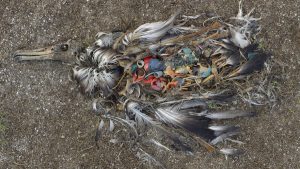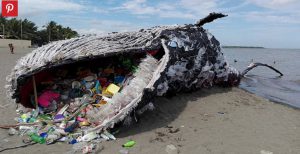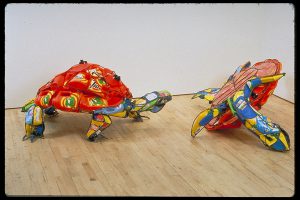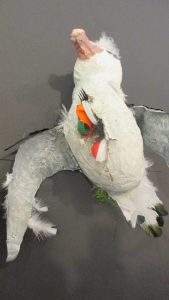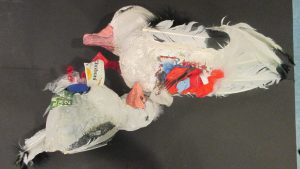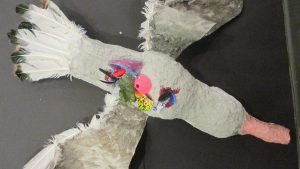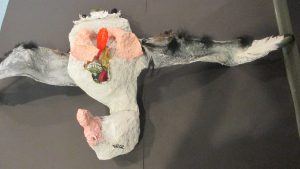Middle School Protest Art Inspires Plastic Awareness & Action

“I just want others to be more aware of themselves and what they are doing. I want people to think about the consequences of their actions on the environment.” – Summer, 8th grade student
In their Painting class with Tina Piccolo this Spring, 8th grade students had a discussion on the impact one-time-use plastics have on global environments. They viewed photographs and current news on how plastics are destroying marine environments, animals, and sea birds.
They then discussed the power visual images have to communicate an idea or concern as seen in many forms of protest art:
Chris Jordan’s photographs of the plastic-filled bellies of decaying albatrosses, Greenpeace’s giant whale “washed up” on a beach, composed of dredged plastic garbage, and sea-turtles made of Tide laundry bottles by artist Christy Rupp.
Students shared what they learned:
- “Although we rarely consider the repercussions of our use of 1-time-plastics, animals and their environments are suffering. The oceans have become polluted, and as a result, animals are dying.” – Clara
- “I learned a lot about how plastics kill sea animals. Often they eat the plastic and die from not being able to digest it.” – Tate
Students then created a painting from observation, by rendering a chosen section of a “stage-set,” composed of model marine birds, animals, and fish, inundated in a sea of plastic debris. The goal was to create awareness in our school community about our own habits and reliance on one-time-use plastics, including the thousands of utensils and cups used in our cafeteria — that cannot be recycled.
Students shared how they felt before, during, and after the experience:
- “Creating these images of animals stuck in/surrounded by plastic was extremely powerful, eye-opening, and inspiring.” – Lila
- “Before I was not as aware about this topic. Studying it more made me realize humans’ impact on the world around them and now I will be more aware of my actions.” – Summer
- “The whole time I felt sad about the animals but happy that we were doing something.” – Ben
- “I felt like I was doing something important by alerting people through art.” – Henry
Through an exhibit of finished paintings in the cafeteria, students aimed to disrupt our community’s complacency and inspire an increased commitment to environmental stewardship and sustainability. Finally, pictures of alternative utensils and cups offered other ideas and solutions to ridding the cafeteria of one-time-use cutlery and cups.
A number of students were inspired to change their own habits and reliance on one-time-use plastics. They shared:
- “I have started picking plastic cups out of the cafeteria garbage and limiting plastic bag usage.” – Zoe
- “I now always bring reusable straws and utensils around.” – Natalie
- “I have now decided to become vegetarian!” – Meghan
When asked to reflect on whether they were successful in raising awareness regarding use of plastics at Brooklyn Friends School – engaging in service learning through advocacy – students shared:
- “I do think we were successful since we sparked conversation between students, faculty, and parents within the BFS community about the dangers of plastic.” – Lila
- “I think we were successful because we make people question their daily choices. Also, the school is now seeking to make a real change on this topic…This is a very pressing issue, and we need to take action on it now before it is too late.” – Tate
Furthermore, Tina’s 6th grade students engaged in team projects in which they fabricated a family of dead albatrosses, theatrically “dissected” to show their bellies full of plastic.
Members of the 5th/6th grade Youth Action Project Jr. group – Alina, Dani, Eden, and Alice – shared the following reflections with Middle School Dean of Student Life Laurice Hwang about how these efforts sparked additional action!
What inspired this action?
In our art class with Tina, she had set up a diorama/scene showing marine animals suffering from plastic pollution. She also talked to us about the effects of plastic on marine life. 8th grade students made paintings inspired by this scene and 6th graders in art worked on creating paper mache albatrosses stuffed with plastic. Alina said, “A lot of times plastic that goes into the recycling bin doesn’t even get recycled.” Eden added,“We felt like we wanted to not only raise awareness, but to take action.”
First we brought the idea to a YAP Jr (Youth Action Project Jr) meeting. We discussed how we could limit our plastic use to help the environment. We decided that we could have a week of plastic awareness. In this week we would have different activities everyday that were related to being aware of the amount of plastic we use and limiting it. Our initial idea was for the 5th and 6th grade to participate in this week but then we thought that 7th and 8th grade might be interested in participating too. When we brought our idea to Glen, he supported the idea. Our next step was to bring the proposal to Student Council to decide on which grades would participate in this activity. The Student Council voted unanimously that the whole Middle School was going to participate in a week of plastic awareness.
MS Week Of Plastic Awareness/Action
(Monday April 30- Friday May 4)
The middle schoolers participated in the following activities:
Mon 4/30- A preview of A Plastic Ocean was shown
Tue 5/1- Count the Cups! How many plastic cups does the MS use in one day? (MS used 76 plastic cups.)
Wed 5/2- Count the Utensils! How many plastic utensils does the MS use in one day? (MS used 234 plastic utensils)
Thu 5/3- Reduce Single-Use Plastic Bags. Can we cut down the number of trash bags and snack bags that we use?
Fri 5/4- No Plastic Day! Try not to use any plastic cups, utensils or straws in the cafeteria! Bring your own utensils/water bottles or use the drinking fountain!
What can we do moving forward?
Moving forward some of the things we could do would be to cut down on using plastic in any way. For example, instead of going to school and using the plastic one-use utensils that are provided at school, you could think about bringing your own utensils from home that you can reuse. Also you should use paper cups instead of plastic because even though using too much paper is bad for the earth paper can break down.
It was eye opening to see the 310 plastic items we used, and while it is hard to change habits right away, “we planted lots of seeds and got people thinking about it for a week.” Seeds take a while to grow, but they grow. Maybe these will.

